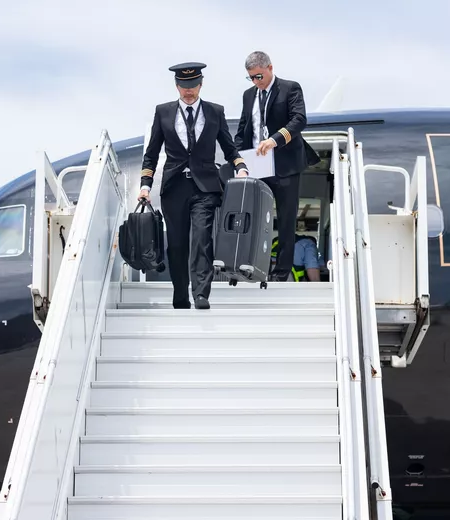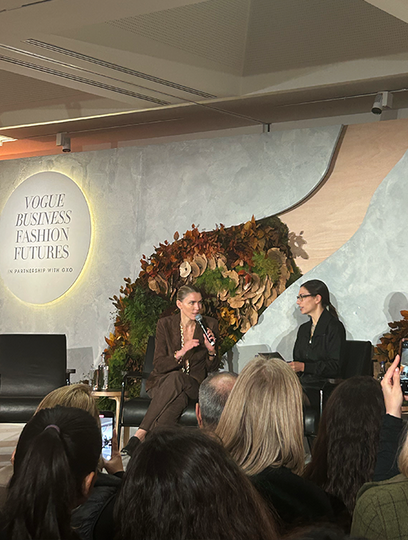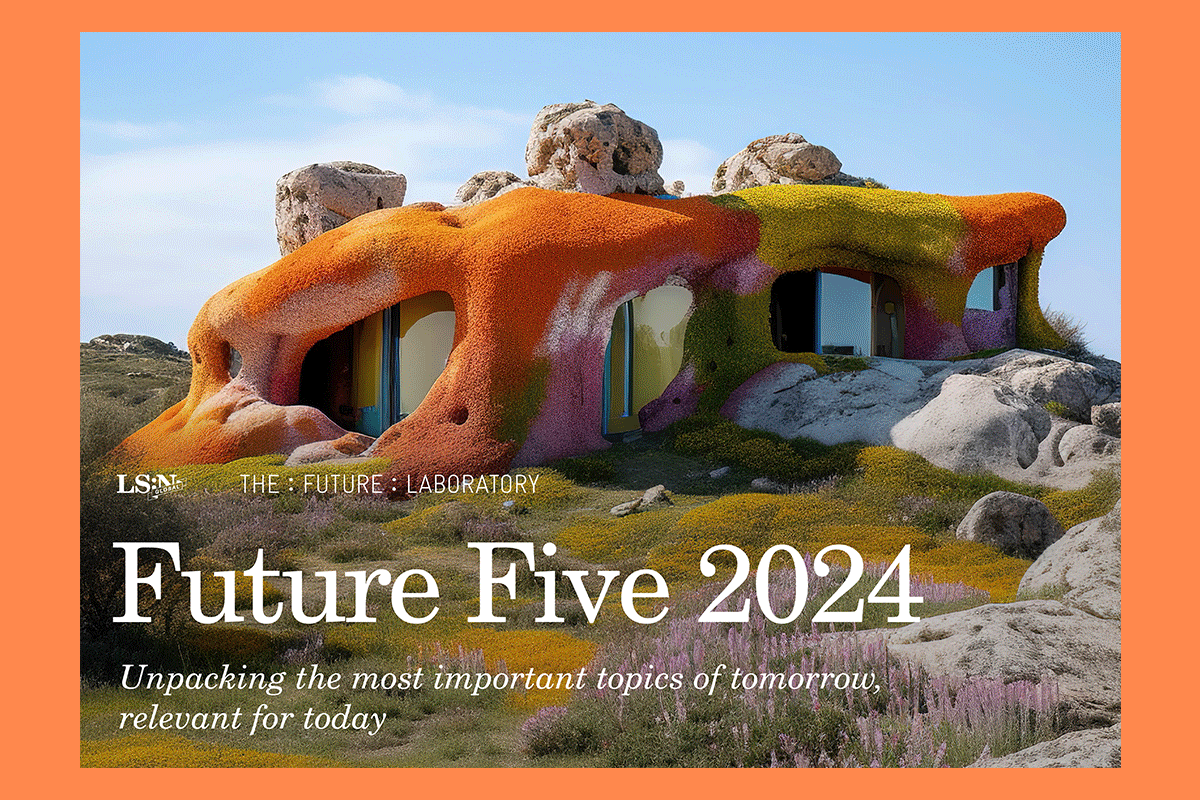01 : 12 : 23 : Weekly Debrief
This week: Lab-grown meat with mycelium, Five Airlines Uplifting In-flight Wellness, Vogue hosts first ever Fashion Futures event, Blue Zone-inspired longevity retreat, and revolutionising beauty for climate change.
1. New hybrid protein blends mycelium with lab-grown meat
China – Mushrooms are commonly used as a meat alternative in vegetarian recipes and now cellular agriculture start-up CellX is taking this idea further, incorporating mycelium fermentation into alt-meat production processes. The result? A hybrid cultured meat, allowing the company to broaden its portfolio of sustainable proteins.
CellX is planning to blend fermented proteins from nutritionally rich mycelium with lab-grown proteins. The chosen mycelium strain contains over 40% protein and 20% dietary fibre, with an amino acid score profile similar to that of conventional beef.
The company claims that mycelium-enhanced proteins have a competitive edge over cultivated meat, which remains very costly, while offering the same nutritional profile as conventional meat.
CellX’s venture also marks a shift in the cultivated meat market. By merging plant-based with lab-grown protein technologies, the company’s hybrid meat alternative paves the way for more experimentation to create sustainable and cost-effective food solutions.
Featured Article
Emerging Youth: UAE
Read more MaxiMootral by Ruby Violet and Mootral, UK
MaxiMootral by Ruby Violet and Mootral, UK
2. Big ideas : Six Innovators Revolutionising the Ice Cream Aisle
Airlines are reviving luxury air travel, transforming the in-flight experience from exhausting to enriching and bringing wellness to 40,000 feet.
Low-cost – and often low-comfort – commercial flights have been dominating the airways for years, stripping back basic comforts and putting a hefty premium on any added extras. Yet now, travellers are expressing renewed interest in premium experiences and motivating airlines to rethink in-flight wellness.
From luxury toiletries to healthier food, optimised sleep spaces and even stretching zones, airlines are beginning to reframe flights as a destination for sleep, relaxation and rejuvenation.
Several airlines are leading the charge in this trend. United Airlines has collaborated with luxury retailer Saks Fifth Avenue and wellness company Therabody to enhance the sleep experience for business class passengers. Beond, a Malaysian carrier, positions itself as the first "premium leisure" airline, offering a luxurious travel experience with business-class seats, fine dining, and entertainment. Private jet hire company VistaJet introduces a comprehensive wellness program, including pre-flight consultations, ergonomic seating, and post-flight guidance.
3. Thai spa launches Blue Zone-inspired longevity retreat
Thailand – Kamalaya, a holistic spa and wellness sanctuary on Koh Samui in Thailand, is launching a Blue Zone group wellness retreat for guests to discover the secrets to longevity and wellbeing from the world’s longest-living regions.
Blue zones are regions across the world such as Okinawa, Japan, and Ikaria, Greece, with high rates of centenarians and low rates of chronic disease. While Koh Samui is not a blue zone itself, the retreat has been designed in collaboration with the official Blue Zones organisation and draws on 20 years of research into these zones and the factors contributing to long, healthy and happy lives.
For six nights in May 2024, guests will undertake a programme filled with meditation, movement, massage, cooking classes and nutritional guidance sessions, in addition to activities such as tea ceremonies, walks, local temple tours and games nights.
By collaborating with Blue Zones, Kamalaya is setting the standard for a new genre of wellness retreats focused on longevity over rejuvenation or relaxation. This is a smart move as interest in Longevity Lifestyles grows and improving and elongating lifespans becomes the mainstay of the wellness industry.
4. Vogue Business hosts first ever Fashion Futures event
UK – The inaugural Vogue Business Fashion Futures event, held at The Design Museum in London on 28 November, brought together founders, manufacturers, regulators and designers to discuss sustainable innovation in the fashion industry.
Hosted by Vogue Business editors Hilary Milnes and Rachel Cernansky, the panels discussed introducing a quantitative definition for what counts as fast fashion, the need for more data and traceability from brands, the logistical limitations of the fashion industry’s current structures – buying seasonally, being slow to implement new technologies, purchasing finished garments rather than fibres and showing reluctance on long-term commitments – and how shareholders, investors and brands can help rethink these systems.
The event closed with a rousing speech from fashion designer and former creative director at Chloé, Gabriela Hearst. Stating that ‘you have to know the ingredients you’re cooking with’, Hearst emphasised the craftsmanship and high-quality materials at the core of her eponymous brand, echoing themes from our Luxury Recrafted macrotrend report.
 Vogue Business Fashion Futures, London, UK
Vogue Business Fashion Futures, London, UK
 AI imagery by The Future Laboratory, UK
AI imagery by The Future Laboratory, UK
5. Revolutionising Beauty for Climate Change
At Dutch Design Week 2023, French foresight and speculative design studio Imprudence revealed a futuristic beauty line created with the intention of tackling the impending threats of the Anthropocene climate. ‘We’ve worked in the speculative design field for a while,’ explains Julien Tauvel, president and co-founder of the agency. ‘We chose beauty because it is the perfect vessel through which we can speak about our environment, our biology, our relationship with our bodies, our appearance and our metabolism.’
Tauvel and his team have been working in this industry for over five years now, combing through scientific explorations and radical and emerging theory to create tangible solutions for extreme futures, eventually developing Chthulu. ‘Everyone is talking about climate change; there is greenwashing and futurewashing,’ says Tauvel. ‘What we need to understand is that this is our new living paradigm; it’s not about becoming more sustainable, it is about adapting to more extreme, radically different conditions.’ As consumers find themselves paralysed by a paradox of choice about which future path is best for the planet and its people, disruptive innovation from science and technology offers a viable solution.
The beauty line consists of five key products, each created to tackle a specific Anthropocene threat.
6. Stat: UK and US adults admit using cannabis or alcohol to sleep better
US, UK – In its Snooze Report released in October 2023, meditation and sleep app Calm suggests that US and UK consumers struggle to get a good night’s sleep to such an extent that they use conventional and unconventional sleep aids.
Based on a survey of 9,500 adults aged 18–65 living in 10 cities in the US and 10 cities in the UK, Calm concludes that over half (55%) of consumers surveyed turn to medication, cannabis or alcohol to sleep better. Over three in four say they do not want to depend on sleep aids, but almost half (42%) can’t sleep without them.
The report highlights the impact of poor sleep on mental health, with 78% of respondents agreeing that their quality of sleep affects their mental health. More than two in three adults (69%) also said they need over seven hours of sleep to improve their mental health.
Hinting at opportunities for health and wellness services to enable better sleep, the report also reveals that almost three in four surveyed are open to trying new things to improve their sleep (73%).
As explored in our analysis of the Sleep Enhancement Market, brands are answering consumers’ need for the perfect night’s rest by turning to technology, sound and space innovations.
7. Future Five 2024
The Future Laboratory’s trends intelligence and foresight platform LS:N Global has launched its latest report, Future Five 2024, a trend briefing designed to help you jump straight to the key insights, opinions and future opportunities that you need to know about right now.
The report is built around the Topics section on LS:N Global, which is dedicated to the issues that brands, companies and collaborators ask us about the most, or in some instances, the things that we think they should be asking about. The report focuses on the five Topics that we think are most important for businesses to be fluent in for the year ahead:
: In the Artificial Intelligence section we explore how we can overcome the ethical issues and fear around the technology to build positive outcomes
: Our spotlight on Sustainability illustrates why brands need to embrace radical transformational business opportunities, while finding new ways to communicate their approaches
: In the Home & Family and Identities sections we highlight the opportunities and challenges created by shifting demographics
: Finally, in the Mobility section we consider how futuristic technology and the influence of the new space age are forcing automotive brands to adapt and diversify

Want to read more?
Become a member today!
Sign up to one of our trends intelligence platform, LS:N Global and get unlimited access to a hive of insights - from microtrends and macro trends to market reports, daily news, research across eight industry sectors and much more.
Discover our memberships
Already a member? Click here to login
